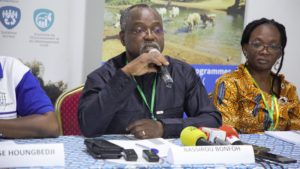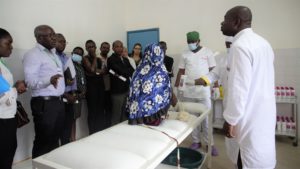27 June 2022
The pan-African research and capacity building programme focused on “One Health” , Afrique One-ASPIRE, held its closing meeting from 23 to 25 June 2022 in Yamoussoukro, Côte d’Ivoire.
Launched in 2016 with the aim of building the capacity of African health researchers and practitioners on the One Health approach in order to better address diseases that are transmitted from animals to humans (zoonoses), Afrique One-ASPIRE has trained more than 72 researchers at master, PhD and post-doctoral levels belonging to different disciplines (epidemiology, social sciences, biology, veterinary sciences, etc.) on the use of the One Health approach.
“The One Health approach is the integration of academic and non-academic knowledge from disciplines, sectors and communities that adds value to the societal level (public health, animal health and environmental health). Thanks to this approach, we have been able to access knowledge that would not have been discovered if researchers were working in silos, without the collaboration of other sectors (human, animal and environmental health) and local communities“, Professor Bassirou Bonfoh, Director of Afrique One-ASPIRE.
that adds value to the societal level (public health, animal health and environmental health). Thanks to this approach, we have been able to access knowledge that would not have been discovered if researchers were working in silos, without the collaboration of other sectors (human, animal and environmental health) and local communities“, Professor Bassirou Bonfoh, Director of Afrique One-ASPIRE.
At the closing meeting, the Afrique One-ASPIRE have presented the knowledge and progress obtained through the operationalisation of the One Health approach during the last 6 years (2016 – 2022). These include firstly, the development of a low-cost tool for storing rabies vaccine at room temperature, making vaccination campaigns possible without electricity in hard-to-reach areas. Secondly, the identification of a new diagnostic tool for tuberculosis, the knowledge related to the interspecific distribution of brucellosis and the means of diagnosis. Thridly, the establishment of links between infectious diseases and non-communicable diseases (diabetes, hypertension) through nutrition and the potential of food types in the management of neglected tropical diseases (e.g. chronic wounds).
 A visit to the Burili ulcer treatment centre at Taabo Hospital in the afternoon of 24 June 2022 has allowed to show a practical case of one health approach application in research for the control of Buruli ulcer, a disease that causes wounds on large areas of the skin. In Taabo, the group of Afrique One-ASPIRE researchers includes sociologists, medical doctors, economists and nutritionists. The collaboration with communities and authorities has helped to (i) identify and deconstruct beliefs about the disease, (ii) stimulate early referral to hospital and (iii) identify foods that can reduce the time it takes for wounds to heal.
A visit to the Burili ulcer treatment centre at Taabo Hospital in the afternoon of 24 June 2022 has allowed to show a practical case of one health approach application in research for the control of Buruli ulcer, a disease that causes wounds on large areas of the skin. In Taabo, the group of Afrique One-ASPIRE researchers includes sociologists, medical doctors, economists and nutritionists. The collaboration with communities and authorities has helped to (i) identify and deconstruct beliefs about the disease, (ii) stimulate early referral to hospital and (iii) identify foods that can reduce the time it takes for wounds to heal.
The research under Afrique One-ASPIRE programme was made possible by funding from a consortium of donors administered by the Science for Africa Foundation (SFA).
“We are pleased with the work done by Afrique One-ASPIRE researchers. It shows that African researchers are able to achieve great things when there is investment in research and in an environment that is appropriate to funds management of and the practice of science”, Alphonsus Neba, Deputy Director of Programmes at Science for Africa Foundation.
About Afrique One-ASPIRE
Afrique One-ASPIRE is a pan-African programme focusing on research and capacity building on the one health approach. It is supported́ by a consortium of funders including the Science for Africa Foundation and the Wellcome Trust. Through the one health approach, Afrique One-ASPIRE has engaged́ in transdisciplinary collaboration between different actors in human, animal and environmental health, policy makers, civil society with the production of nearly 214 scientific papers, a dozen policy briefs and training of nearly 12,000 practitioners on the ‘one health’ approach. The global partnership has enabled African researchers to contribute to important advances in the understanding of transmission, control and zoonoses.
Pour en savoir plus, sur les réalisations d’Afrique One-ASPIRE, cliquez ici.
Share on: